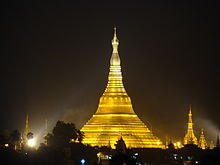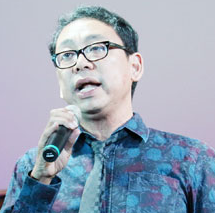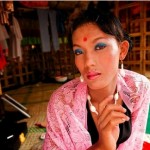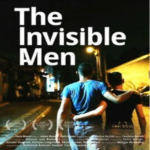The rocky road to Mandalay is full of potholes and the traffic is slow. The land is also full of pitfalls for lesbigay natives in Burma who know little about gay pride and sexual identity. The gentle guys and virtually invisible lesbians are naive and secretive. But 2015 brought democratic elections and a new Parliament that is likely to be more tolerant toward LGBT citizens than the previous military dictatorship. (See this report on the most significant change in government in 50 years: New era dawns as Aung San Suu Kyi’s party strides into Burma parliament: www.telegraph.co.uk/news/worldnews/asia/burmamyanmar/12133120/New-era-dawns-as-Aung-San-Suu-Kyis-party-strides-into-Burma-parliament.html)
By Richard Ammon
GlobalGayz.com
Updated October 2016
Also see:
Gay Burma News & Reports 2003 to present
Gay Burma Photo Galleries
Discretion from an Activist
The first person I asked about gay life in Burma was a Burmese gay activist in Bangkok who could not talk to me much because he was under surveillance by “authorities” (read, Burmese informants) who suspected his activityies and motives. At that time, Aung Myo Min (“Myo”) served as director of the Campaign for Lesbigay Rights in Burma (CLRB), a committee established in mid-1996. (photo right Schwedagon Pagoda, Rangoon)
I wasn’t sure if it was to protect himself or me that he preferred to give me the name of someone already inside Burma, a hairdresser in Rangoon. His efforts on behalf of oppressed people in Burma have cut both ways. Last year he received an award from the International Gay and Lesbian Human Rights Commission for his “guiding passion” for empowering lesbigay communities through confidential workshops he organizes with gay Burmese activists who manage to go regularly to Thailand.
 But being out and active resulted, from time to time, in his having to ‘exert discretion’, an expression I heard meaning being quiet and remote. My contact with him was immediately before he retreated from view, as my e-mails to him went unanswered for a week prior to my departure.
But being out and active resulted, from time to time, in his having to ‘exert discretion’, an expression I heard meaning being quiet and remote. My contact with him was immediately before he retreated from view, as my e-mails to him went unanswered for a week prior to my departure.
However, by 2012 Myo (photo left) had regained his public voice and was speaking out (from Thailand), this time as director of the Human Rights Education Institute of Burma. In a commentary in the Irrawaddy online news site, he criticized the opaque methods of both the Myanmar National Human Rights Commission (MNHRC) and the Asean Intergovernmental Commission on Human Rights (AICHR). “Burma is still a long way from being a country where people’s human rights can be respected and protected…. There are still hundreds of [rights activists] behind bars, forgotten by the international community.”
By February 2016 Myo had continued his outspoken advocacy of human rights. He was courageous enough to be interviewed in the English language newspaper Myanmar Times in which he had these 2016 post-election comments in response to a reporter’s questions:
MT: Do you think the National League for Democracy {led by Aung San Suu Kyi} and the change of government can help with this? (The NLD won a majority in the first democratically-elected parliament since 1960 in the country.)
Myo: I don’t know, I haven’t talked to them. But we have to talk.
MT: Will the NLD be able to change the constitution and really make a difference?
Myo: I have no doubt the NLD wants to change the constitution. But they are not in the executive sector yet. Many people in the government staff belong to the previous government; they are old and out of date. They don’t want the change, because they see it as a kind of threat for their lives. The NLD will have to face many challenges. They will have to negotiate, for the proper process of transfer of power. I hope they will do the best for the sake of the people, the future of the country, and not for them and only the party.
Paranoia from an Aussie
My next contact (2010) was an expat Aussie staying at the gay-owned Tarntawan Hotel in Bangkok, Ronald, in his late fifties. He wanted to know what periodical I was writing for, noting that my motives needed to be kept very circumspect and discreet once I entered Burma. “It is literally very dangerous for a Burmese person to be seen talking with a foreigner. The government has created an atmosphere of suspicion and anyone can be called in for questioning for any reason.” So ensued a short but starkly alarming conversation about my intentions.
“The Burmese government is more ruthless about bad information than about smugglers or opium dealers,” Ronald exclaimed. “If you talk to someone about the wrong things, you realize you may be putting their lives in danger. People just don’t’ talk about anything political–anything else yes, but nothing controversial”.
Then, changing tone and the topic to one of his favorite subjects, Ronald added cheerfully, “but if you’re going there to have sex with the boys, no one cares. You can do that all you want, and it isn’t that difficult. Just don’t talk about politics.” (Thinking back to my own salad days I hardly recall any political discussions in the sensuous throws of carnal pleasure.)
Frustration from a Frenchman
A French businessman also staying at the Tarntawan Hotel, Jacques, offered his thoughts on Burma where he travels about once a month for business reasons. He described how the military government in Burma recently (in 2005) pulled the plug on its state-run ISPs and cut off Internet access for those few Burmese who could afford or were savvy enough to use it. The paranoid thinking of the ruling junta was that the democratic opposition was using it for ‘counter-revolutionary’ purposes, which could not be tolerated. It was hardly a way to conduct a “Visit Myanmar Year” campaign.
 Jacques described how the universities in Burma were closed years ago (except for the medical school and the Buddhist Universities) to prevent political foment and organization. It may have silenced some students but it also stunted educational and professional growth among the next generation of leaders and businessmen. Perhaps the generals in uniform think military training is equal to advanced university research.
Jacques described how the universities in Burma were closed years ago (except for the medical school and the Buddhist Universities) to prevent political foment and organization. It may have silenced some students but it also stunted educational and professional growth among the next generation of leaders and businessmen. Perhaps the generals in uniform think military training is equal to advanced university research.
Jacques also said that people fear to make contact with foreigners and once-friendly natives now offer a kind of blank stare that makes him feel invisible. He also said that one of the major gripes against ‘The Lady’, opposition leader Aung San Suu Kyi, the Nobel Prize winning leader of the National League for Democracy in Burma, was that she married a British husband Michael Aris, an untrustworthy foreigner. She has been persecuted and confined intermittently by the junta who prevented her party from taking leadership after winning the 1990 elections. Her husband died in 1999 and she was not allowed to be with him. In 2012 she was again freed and allowed to travel to the West, including Norway to finally pick up her Novel prize.
In another incident, Jacques described how two young girls, one Australian one Burmese met on bus and chatted all the way to their destination. The native girl invited the foreigner to stay overnight at her home with her parents and insisted that she come home with her. After arriving home and being spoken to by the parents, the girl, in tears, told her new friend that she could not stay with them because the police would come questioning them about their behavior with a stranger. The guest had to go find shelter elsewhere. “It was sad but true”, he said.
No ‘Welcome’ Sign
Armed with all this less than cheerful news, and without my laptop, I flew to Rangoon, the dusty bustling capital of Burma (renamed Myanmar by the ruling military junta) and went to the hair salon recommended by Myo. It looked more like an old low-ceilinged storage loft than a business venue. It appeared shabby and felt third rate. After two tries at making myself understood (a foreigner at the door is not a welcome sight here), and asking to speak with the recommended guy, things got even more uninviting. The stylist would not come out of his work station, just on the other side of a closed door, to say hello. He passed a message that he was busy and also would be out of town for the next few days. I left and did not call in again. It was not an informed start to my inquiry about lesbigay life in modern Burma.
Ask the Manager
Having no other contacts to pursue about homosexuality in Burma, a few days later I decided to ask the Indian-Burmese duty manager in my cushy hotel in historic Mandalay. We had chatted slightly since my arrival and he seemed open and friendly–and he couldn’t run away. So I asked him politely how homosexuality is viewed in his culture. Most of the Indian-descent Burmese are Roman Catholic so I was rather anticipating his answer within that context. I chose my words to not refer to religion but to his culture. He was unruffled by my question, being a well-trained hotelier, saying that homosexuality is not acceptable to his culture but that a gay person would not face any aggression or persecution. (There is no specific law that forbids it.) According to manager William, if a person were out about himself he would be avoided by his (presumably straight) friends, but “if he forgot about that” he would not be shunned. Unmarried men and women must live with or care for their families; a gay son or daughter would not be rejected by the family yet would be expected to keep quiet about his feelings, at least as long as the parents were alive.
A Few Words from the Waiter
The next voice I heard from was a young-twenties waiter at the hotel restaurant who seemed a bit friendlier than the others. I was less direct with this one, suspecting he might be one of us, and did not want to embarrass him in front of others. We exchanged some light comments during the meal (the invariable first question is “what country are you from?”) and over dessert he asked whom I was here with, another question I was often asked.
 It was usually asked out of curiosity rather than duplicity. When the waiter asked if I had a wife (another common question), I said I had a boyfriend. He giggled slightly but did not turn away. “And you?” I replied, “Do you have a wife or a boyfriend?” Another giggle, along with a little embarrassment, but he confessed yes, a boyfriend. Ah, a source of gay information at last, I thought. But not for long.
It was usually asked out of curiosity rather than duplicity. When the waiter asked if I had a wife (another common question), I said I had a boyfriend. He giggled slightly but did not turn away. “And you?” I replied, “Do you have a wife or a boyfriend?” Another giggle, along with a little embarrassment, but he confessed yes, a boyfriend. Ah, a source of gay information at last, I thought. But not for long.
It only took a further question or two from me to realize his English vocabulary was mostly confined to his job, serving courses or offering water; polite functional comments. My question–do you live with your boyfriend?– strained his language range. He frowned. I repeated the question in reduced terms “You (pointing to him) and boyfriend (pause) live same house? (a hand gesture suggesting together). “Oh, no. Not live together (pause). He live family. Only see sometime.” Ah, (pause). Good. Nice boy? “Yes”. How old? “Twenty three.” This was not going to be an in depth interview. I managed to glean from three more simple questions that his own family did not know about him.
This kind of talk with an essentially non-English speaker becomes tedious and tiring. So after a couple more pleasantries and smiles, I dropped the inquiry. There was nothing new here. I asked his name which sounded something like Daniel (Ahne Yit?), a young closeted man with a secret love affair kept hidden.
I noticed a couple of other waiters who seemed to be his friends who snickered and gossiped about his talking with me. I suspected they knew his story and were kidding him about being charmed by an older foreign man. Since there were very few independent travelers in Burma those days (most are bus groups of straight French, Germans and Italians), I was a bit of a novelty and his friends could see he was attentive to my table. So, like teenage girls they clucked and giggled and fluttered as they went about their work. I doubt he was deliberately ‘out’ with them, but rather they simply knew from working with him that he was ‘different’ and were not bothered about it. He certainly did not seem to feel self-conscious about spending extra time with me.
Unfortunately, his lingering proved of little value for my understanding, other than the little he shared and the little I gleaned from watching him.
Hotel Room Service from ‘Curious’
Next in line was a friend of Daniel’s, Jojo. Word had spread about me and Jojo called me later in my room and said he was a friend of Daniel’s. Daniel wanted him to speak to me since Jojo spoke much better English. He was a university graduate who worked in housekeeping in the hotel. One of the many lunacies of the military takeover and the embargo is the pitiful lack of job opportunities for graduates who take menial jobs well below their competency to eke out a living.
(Living with family groups brings down living costs to within a few dollars a month. Another university student in physics drove a taxi and said his family of six lives in a government-owned three-room apartment; the rent is about fifty cents a month with electricity about $1.50 and phone an ‘outrageous’ $11 a month.)
I was able to ask Jojo more complex questions about homosexuality in his country. Although he professed to be straight he was quite willing to talk about my interests. We first chatted about him: he was a university diploma was in tourism, which certified him to lead tours. However he had taken this job at the hotel because his parents thought he was too young to be going away with strangers. That was three years ago and now he was ready to market himself to agencies to do tours. His English was reasonably good although l’s, r’s and w’s are really difficult for the Burmese. He was a Buddhist.
A New Theory of Homosexuality
When I asked him about homosexuality his first reply, in line with traditional thought, was that it was not ‘bad’ in the sense of a ‘sin’ (there is no such term in Buddhism) but more of a ‘problem’ with bad karma, a present-life result of a past-life action–due to sexual misconduct with a woman in a previous lifetime (adultery). Certainly the most unique cause of male homosexuality I’ve ever heard!
If folks with queer karma gave up their gay activity in this life (or had only a few lapses) he or she could come back next time as straight! But if they persisted in the lifestyle it was certain the next life would be another queer episode. Jojo was serious and sincere as he described this vision of sexuality, spiritual evolution and cycles of life. (I forgot to ask about lesbians!)
Not being at all familiar with the complexities of western psychology and the inherent nature of homosexuality, he could do little else than repeat what he had picked up from Buddhist friends, family or clergy. It made for an engaging conversation suggesting possibilities I had never considered–that sexual orientation went beyond genetics, mommy or daddy by putting sexual orientation simply at the karmic effect of ‘misbehavior’. I was sure this was a unique paradigm of cause-and-effect that few western educated minds would easily embrace.
Ten Monks and A Queer
Another memorable talk was with a group of Buddhist monks at the Buddhist University in Mandalay. Walking onto the campus of the Buddhist University in Mandalay it only took a few minutes to strike up conversation with several of the monks garbed in burgundy robes, all with shaven heads and dark eyes. They had just finished their last meal of the day, at 11:30 AM, and were free for the early afternoon hours. One of them suggested we go back to his living quarters to talk in the cool shade and I made it clear that I wanted the whole group, by now about eight or ten who were eager to practice English, to come along as well. (photo left)
 So there I was, a blue-eyed, western, materially consumed doctor of psychology, and a dozen celibate, poor and obedient monks wrapped in swaths of burgundy cotton. Their English was about seventy percent proficient for speaking (better for writing). The first question from them concerned the difference between western and Buddhist psychology. My initial reply focused on the contrasting concepts of the ‘self’. In the west ‘self’ is revered and valued virtually above all other mental concepts, whereas Buddhist theory defines the self as an illusion which causes endless suffering because of its needs, desires and attachments. They agreed, further pointing out that not even our names have any reality. There was some further chat about Buddhist studies and specialization majors. Several were specializing in Sanskrit and Pali so they could read the original Buddhist scripts. Very nice, but I was more interested in finding out what they thought of gay-oriented people so I stepped up the nature of our dialogue: “I would like to understand what Buddhism thinks about homosexuality–you know when a man wants to be sexual with a man or a woman with a woman.”
So there I was, a blue-eyed, western, materially consumed doctor of psychology, and a dozen celibate, poor and obedient monks wrapped in swaths of burgundy cotton. Their English was about seventy percent proficient for speaking (better for writing). The first question from them concerned the difference between western and Buddhist psychology. My initial reply focused on the contrasting concepts of the ‘self’. In the west ‘self’ is revered and valued virtually above all other mental concepts, whereas Buddhist theory defines the self as an illusion which causes endless suffering because of its needs, desires and attachments. They agreed, further pointing out that not even our names have any reality. There was some further chat about Buddhist studies and specialization majors. Several were specializing in Sanskrit and Pali so they could read the original Buddhist scripts. Very nice, but I was more interested in finding out what they thought of gay-oriented people so I stepped up the nature of our dialogue: “I would like to understand what Buddhism thinks about homosexuality–you know when a man wants to be sexual with a man or a woman with a woman.”
Silence.
After a pause, I asked if they understood the meaning of my English. Yes, they understood my words, but could I please explain. With their brown faces very attentive and frowning, they listened as I described that in all world cultures there are men attracted to men and women to women, trying to keep my words simple, clear and logically sequenced. It felt like trying to explain hiccups to Martians. Here was a huddle of all-male celibates being asked a question about sex, a topic that has probably been discussed least in their Buddhist discipline and education.
Sex and Buddhism
Slowly, looking to each other to parse their way toward a reply, a couple of the monks, one a graduate student the other a faculty tutor, framed sexual desire as an attachment to the body. As one of the basic precepts of entering the monastic life, a monk must surrender his sexual desire.
Sexual energy, in their view, is a major cause of temptation, misbehavior and suffering. People become caught in endless cycles of desire, momentary conquest followed by further craving and discontent. This idea is of course not unknown to western Christian monastics. Celibacy is pledged as part of a discipline of dedicating one’s life in the service of God, although the Buddhists don’t see bodily lust as sinful. Rather, it’s more of a natural condition to be released and not pursued.
For most of us secular types abstinence is puzzling, even anxiety provoking. Sex, we say, is a God-given gift of delight, intimacy, and pleasurable mystery as well as a force for procreation. The more the better, some proclaim.
But for my somber red-robed hosts in the university, it’s a desire that that can and should be surmounted by discipline and practice. By refocusing one’s thoughts toward “right thinking, right speaking and right action” through the concentration of meditative practice, they explained with difficulty (especially in their pronunciation which caused me to request repeated sentences), to see how desire is only a thought, an illusion, not real, but only imagined–like personal identity or the soul.
In meditative practice, one can replace negative or bad thoughts with “another object” (using an analogy, the tutor said, it was like changing from color blue to color yellow).
 Through such commitment and training, they claim, one can change one’s personality, desires and actions. One can change one’s ‘natural’ self (which Buddha observed, is in a state of “suffering through craving”) to an unattached self, free from such ‘bad’ behavior as sexual desire.
Through such commitment and training, they claim, one can change one’s personality, desires and actions. One can change one’s ‘natural’ self (which Buddha observed, is in a state of “suffering through craving”) to an unattached self, free from such ‘bad’ behavior as sexual desire.
But, I asked, if sexual desire is a natural human attribute, why should one want to get rid of it? They suggested that one does not get rid of it, one rather controls it by refocusing and therefore is not ruled by it, not ruled by the suffering hunger to repeatedly have more of it.
They admitted it was difficult to let go of worldly desires: “it is like drinking salt water; at first it is not easy but one keeps practicing.” I laughed playfully with them as they all seemed to agree that living such a discipline had its challenges. I suggested that if it were not for sex, none of us would be here, which amused them.
In the storm of controversy about the nature and etiology of queerness in the west and all the suppositions of learned psychologists and biologists, it was a delight to hear their spiritual views about this wondrously complex issue.
Hidden Professionals
I had not come to Burma to analyze the socio-political-economic structure of the country, although one gets sucked into it wondering how things got so bad here when much of the world is more progressive. I came here wondering what life is like for gays in such a bastion of Buddhism and militarism. It is not an easy task. Since there is no outward visible gay presence in Burma. My search was at best an occasional conversation with various native folks: a hotel manager, hotel  workers, Buddhist monks, in addition to my Bangkok friends. There are of course the furtive cruising places where the night protects the secrecy of closeted gays who are single or married. It’s a universal scene but I did not know of any in Burma.
workers, Buddhist monks, in addition to my Bangkok friends. There are of course the furtive cruising places where the night protects the secrecy of closeted gays who are single or married. It’s a universal scene but I did not know of any in Burma.
A few days later at dinner with a well-placed Burmese businessman and friend, I asked if he knew any professional gay folks who might talk with me. He did know a doctor who had to be very discreet and who had a circle of like-minded compatriots. I very much sought to talk with him to gain an understanding of how he functioned as a gay man in such a heavy environment.
But because my time was short before departure and the doctor very busy, we couldn’t make contact. However, there is still a chance that we might share some ideas through e-mail. That is, when the government decides to stabilize their Internet connection (although for some reason, I was able to send and receive e-mail at my Rangoon hotel). One doesn’t ask how or why in Burma.
Another story: Nat Kedaws
A couple of years later I was in Asia again when I saw a program on FocusAsia (Star TV) which featured a slice of Burmese life I missed during my visit: Nat Kedaws. These are gay/transgender men who ‘marry’ Nats–invisible spirits thought to inhabit nature–in trees, water, wind, etc.  These men then become human representatives of these invisible spirits. (photo right)
These men then become human representatives of these invisible spirits. (photo right)
See this 2016 report about LGBTs on Burma LGBTs: http://www.telegraph.co.uk/women/politics/gay-people-in-burma-live-secret-lives-will-aung-san-suu-kyi-libe/
See this National Geographic photo essay on the Nat Kedaw shamans: http://www7.nationalgeographic.com/ngm/0605/feature5/multimedia.html, also this academic study.
















